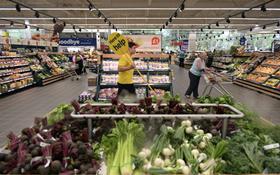
Tesco plans to reintegrate its fresh produce buying teams into a single department, FPJ has learned.
Under the current structure Tesco sources fruit and vegetables from a UK department in this country and Group Food Sourcing globally.
However, as part of new CEO Dave Lewis’s plan to strip out cost ahead of a move to a new head office at Welwyn Garden City, all sourcing will once again revert to a single department.
Kris Comerford will head up the unified fresh produce department, reporting to Matt Simister. Group sourcing director Darren Clough is understood to have been moved to Tesco’s central European operation.
It marks a turnaround in fortunes for Simister, who was suspended last year in the wake of the Tesco financial scandal. However, he was exonerated and returned to the business in December, and now takes on one of the most important jobs at the supermarket.
Tesco is currently undergoing cost-cutting measures of up to 30 per cent of its head office functions, and Comerford now faces the unenviable task of having to remove duplication as he integrates the UK and GFS teams. That could mean a number of buyer and technical jobs are in jeopardy.
Suppliers have largely welcomed the move to revert to a single department. “It was the right thing to do,” said one. “It was an impossible company to deal with. Slimming down will make the decision-making process easier and it’ll be more user-friendly. It’ll still be aggressively implementing the GFS strategy in terms of dealing directly with growers, open purchasing and so on, so GFS will live on even if not in name.”
Another supplier said the move did not mean that GFS had failed as a procurement model. “This is really about placing the GFS model at the heart of Tesco’s produce procurement, and in that sense I think it shows it’s been a success since it was first introduced a few years back,” he said.
“It’s essentially about removing the duplication that now exists between GFS and Tesco’s own in-house buying teams. The GFS approach has been proven to work in many cases, and now it’s about integrating that system. Obviously it also allows the company to remove a number of roles and make it a more streamlined operation, but from a suppliers’ perspective I don’t see this as a bad development.”



